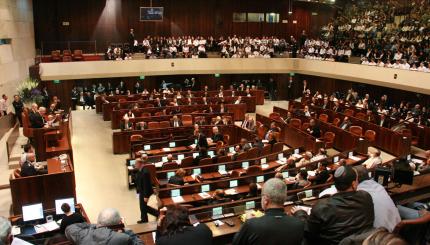A professor friend of mine has been thinking about moments of interruption. How do we cope when they intrude upon our lives? Death is perhaps the most extreme example of this as in many ways our lives come to screeching halt in order to bury and mourn our loved ones. Jewish tradition has a number of rules as to when someone can interrupt their prayers to greet someone or remove their screaming baby in the middle of silent prayer. When can one interrupt performing one mitzvah if another one beckons as well?
But we know that the most interruptions occur when we are in conversation. Sometimes we assume that the person interrupting is simply rude, while the interrupter may feel that it is crucial to the moment. Universities have to make rules about when it is or is not appropriate to interrupt a speaker.
Circulating on the web now is an extraordinary talk by MK Ruth Calderon in her first Knesset speech. It can be viewed here in Hebrew and it is translated here. Aside from the content and the reclaiming of Jewish tradition and text for all Jews, there are two moments that stand out for me. One is her acknowledgement of Rabbi David Hartman who had just passed away. Secondly is when Chairman Yitzhak Vaknin (Shas) interrupts her presentation:
Calderon
Rabbi Rechumei – a rabbi, a rav, a whole lot of man [“rav” can mean “rabbi” or “much”]. “Rechumei” in Aramaic means “love”. Rechumei is derived from the word “rechem”, womb, someone who knows how to include, how to completely accept, just as a woman’s womb contains the baby. This choice of word for “love” is quite beautiful. We know that the Greek word for “womb” gives us the word “hysteria”. The Aramaic choice to take the womb and turn it into love is a feminist gesture by the Sages.
He was constantly, he could be found before Rava, the head of the yeshiva at Mechoza…
Chairman Yitzhak Vaknin (Shas):
Rechem also [has a numerologically significant value of] 248.(the number of positive commandments out of 613)
Calderon:
Thank you. Yasher koach.
Calderon:
Thank you for participating. I am happy…
Vaknin:
I think the idea she is saying is wonderful…
Calderon:
I am happy about this participation in words of Torah.
What is lost in this moment of the English translation is that as Vaknin adds his thought, there are sounds from the Knesset of what appear to be some protesting his interruption of Calderon’s speech. However, she apparently does not see it as a rude interruption, but rather a genuine moment of Torah study. In that short exchange a woman who is self-described as “very Jewish, very Zionist, secular-traditional-religious home that combined Ashkenaz and Sepharad, [Revisionist] Betar and [Socialist] Hashomer Hatzair,” has a brief exchange of Torah with a member of Shas. For those few seconds Ruth has transformed the Knesset into a Beit Midrash, a place while still filled with conflicting voices, but now for the sake of Torah. It was a brief, but real moment of a shared religious passion. Although Torah study is generally not the agenda of the Knesset, may more interruptions for the Sake of Heaven be found.
Knesset
Pronounced: k’NESS-et, Origin: Hebrew, Israel’s parliament, comprising 120 seats.
mitzvah
Pronounced: MITZ-vuh or meetz-VAH, Origin: Hebrew, commandment, also used to mean good deed.
Torah
Pronunced: TORE-uh, Origin: Hebrew, the Five Books of Moses.
yeshiva
Pronounced: yuh-SHEE-vuh or yeh-shee-VAH, Origin: Hebrew, a traditional religious school, where students mainly study Jewish texts.
Yitzhak
Pronounced: eetz-KHAHK, Origin: Hebrew, Hebrew name for Isaac.


